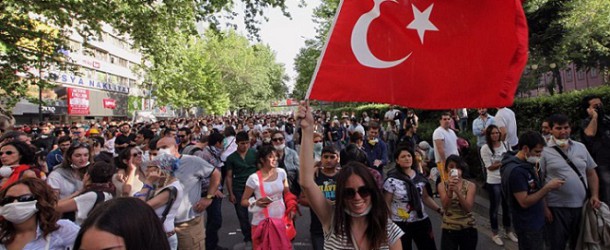The overwhelming victory of eurosceptic and far-right parties in last week’s European Parliament elections made the headlines all over Europe.
Spain is one of the few countries where no far-right party gained nationwide support. The big surprise of Spain’s election was the emergence of “Podemos” (meaning “We can” in Spanish), a new left-wing party, which obtained more than 1.2 million votes (8 %) and 5 seats in the European Parliament, despite having been formally established only four months ago.
The European elections results have caused a major setback on Spain’s traditional bipartisanship. For the first time, the votes of the ruling conservative Partido Popular (PP) and the opposition Partido Socialista Obrero Español (PSOE) taken together fell short of the 50% of the total votes. Reacting to the spectacular success of “Podemos”, politicians from both right and left have warned of the rise of the extreme left and have compared it to the Latin American-style regimes.[1]
European elections are often understood as second-order national elections. Voter turnout is lower and representation of smaller parties is higher. However, “Podemos” wants to repeat its success in next year’s general elections with an aim to unseat the ruling PP party. Spain’s new leftwing party opposes austerity and the “political caste”, finding inspiration in the 15-M (indignados) movement[2], the citizen movement that broke out in Spain in 2011. Despite little economic resources (the campaign was financed via crowdfunding) and almost no media coverage, “Podemos”’ political message spread virally through social media. After the election results were released, all media attention suddenly turned on them.
The 15-M movement has celebrated its third anniversary this year. One of the historical claims of the protest movement has been to push for radical change in Spanish politics allowing greater citizen participation and putting an end to the privileges of the political caste. However, the movement never evolved into a political party.[3] “Podemos” wants to demonstrate that political change is possible presenting itself as an alternative political option. They have emerged as a successful story integrating social demands and political parties. The question is: they have come to stay?
A year ago, Turkey experienced the biggest mass demonstrations of the Republican era. Environmental protests over the demolition of Gezi Park rapidly turned into a nationwide anti-government protests. However, the ultimate reasons that led to the protests in Spain and Turkey were different. While in Spain the protests were mainly prompted by the worsening economic situation and the malfunction of the political system, the protests in Turkey were directed at the figure of Erdoğan at what critics say is an aggressive and authoritarian style of governance.
Last year government’s heavy-handed response to the protests could not overshadow the emergence of a vibrant civil society in Turkey. High hopes were placed on active citizenry as the only hope for the country. Gezi protests have created an unprecedented sense of solidarity among disparate segments of Turkey’s society. However, the results of this social experiment appear to be underway. A year later, the political situation in Turkey has gone from bad to worse. Increased police and state violence and the government’s continued curtailment of citizens’ basic rights have been a real test for Turkish democracy.
Young Turks have grown up under Erdoğan’s 12 year-long rule and they are increasingly dissatisfied with the Justice and Development Party (AKP) dominance over Turkish politics. On the other hand, the main opposition party, the Republican People’s Party (CHP), has failed to take young people’s views on board.
Turkey should urgently listen to the new generation of forward-looking Turks who are struggling to make their collective voice be heard in the political process. Like in Spain, young Turks do not want to decide anymore between AKP and CHP.
Laura BATALLA
[1] La Vanguardia, Felipe González sobre Podemos: “La alternativa bolivariana sería una catástrofe”, 29 May 2014, http://www.lavanguardia.com/politica/20140529/54409416644/felipe-gonzalez-sobre-podemos-la-alternativa-bolivariana-seria-una-catastrofe.html
[2] For more information on the development and evolution of the 15-M movement see https://www.academia.edu/6317100/Citizen_participation_in_Spain_after_15-M_a_turning_point_in_Spains_political_culture
[3] With the exception of “Partido X”, a political party founded in early 2013 by a group of 90 people related to the 15-M movement. Despite receiving more than 100.000 votes in the past European elections, the party did not win a seat in the European Parliament.
























































